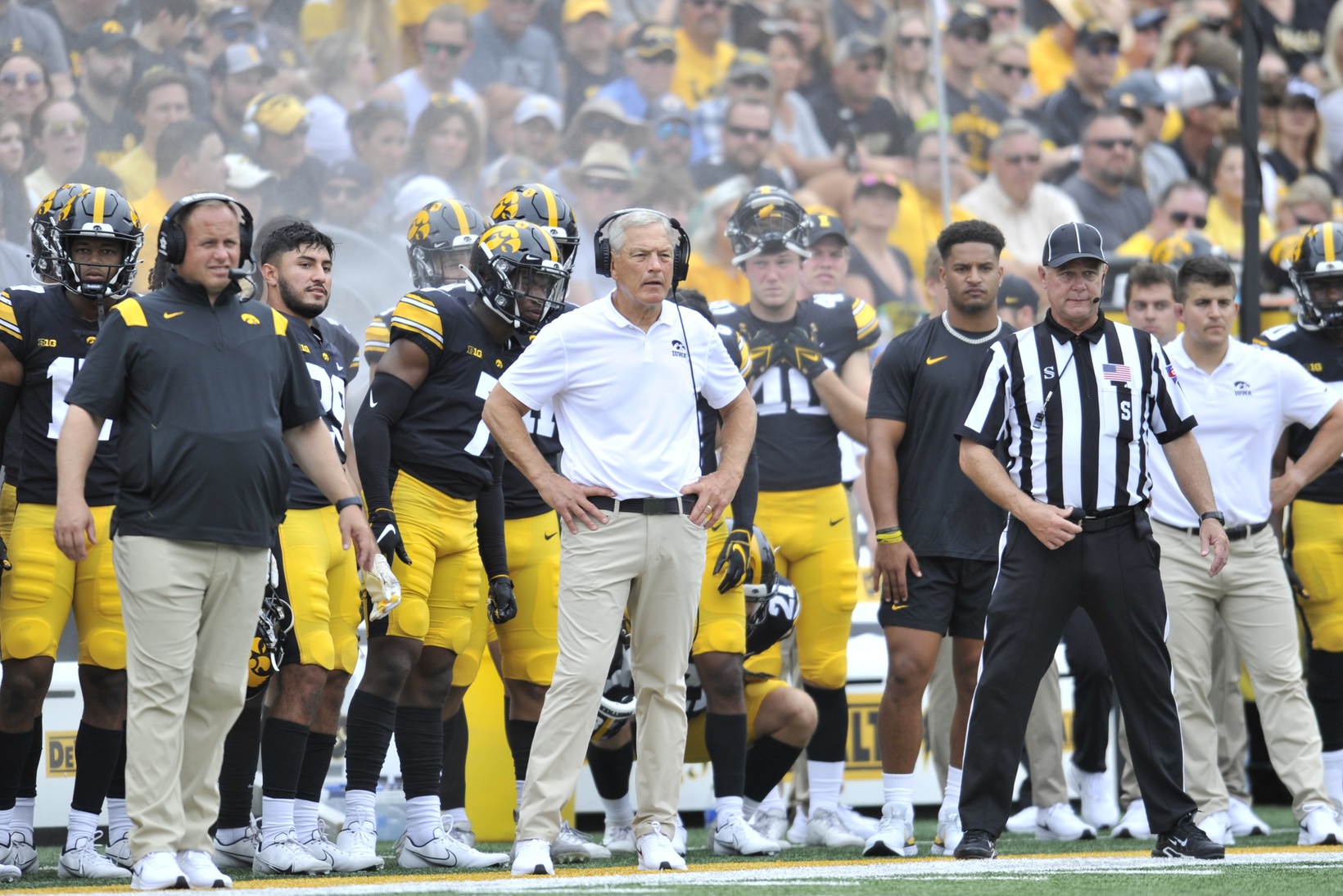It shouldn’t come as a surprise that there will be no changes to the Iowa coaching staff this season. Why would there be? In Kirk Ferentz’s 24 years as head coach at Iowa, he has never fired a coordinator. Before his time at the helm, Hayden Fry never fired a coordinator at Iowa. That makes 44 seasons where a coordinator has never been relieved of their role in Iowa City. This year won’t be different. Ferentz announced last week, “I anticipate no changes in our staff moving forward…I think we do have a terrific staff, and I thought they did a terrific job last year in tough circumstances.” Iowa will retain its coaching staff for the 2023 season and the offensive coordinator has new incentives to go with it.
Iowa’s 2022 Offensive Experience
Iowa’s offense ranked outside of the top 120 FBS programs in every major statistical category. They finished 130th in total offense, 123rd in scoring offense, 130th in total first downs, 129th in third down conversion percentage, and 128th in red zone attempts. This wasn’t just a one-off season either. Since Ferentz’s son Brian Ferentz took over as the offensive coordinator, the offense has trended in the wrong direction.
In an effort to track Ferentz’s offense on a year-to-year basis, take an average of Iowa’s national rankings in the aforementioned categories: total offense, scoring offense, first downs, third down conversion percentage, and red zone attempts. The 2022 offense would have an average ranking of 128th nationally. In 2021 that ranking was 103rd, and in 2020 it was 73rd. In 2019, it was 86th, and in 2018 was 57th. Other than the 2020 season in which many teams were fielding depleted rosters and questionable schedules, a five-year sample set indicates a definitive decrease in overall production.
History of Bouncing Back
In general, Iowa has historically rebounded from seasons with poor performances. Ferentz mentioned that at his press conference last week. He referenced 1989 when Iowa went 5-6. The following season, Iowa was 10-1 and went to the Rose Bowl. The same could be said for the 2014 season. Iowa finished 7-6 with a blowout loss in a bowl game. The next year, Iowa went undefeated in the regular season and played in the Rose Bowl. The rebounds have happened, but some key metrics were much different from those years.
In their bad 1989 season, Iowa averaged 343 yards per game and 18.0 points per game. Iowa’s 7-6 campaign in 2014 averaged 400 yards and 28.2 points per game. The numbers look much worse for this past season. Iowa’s offense averaged 251 yards and 17.7 points per game in 2022. Those metrics also came in a day and age where the FBS team in the 50th percentile offensively averaged 390 yards and 28.4 points per contest.
Contract Incentives
To address the situation, the University of Iowa Athletic Director Gary Barta announced an amended contract for the team’s offensive coordinator, Brian Ferentz. The contract went into effect on February 1st. It includes a $50,000 pay cut for a new annual salary of $850,000 along with new incentives. These incentives include a $112,500 bonus if Ferentz’s offense meets the following two performance objectives:
First, Iowa must score an average of 25 points per game next season.
Second, Iowa must win at least seven football games including a possible bowl game.
Instead of firing a coach for boasting offensive statistics in the bottom five of the FBS with a downward trend over the past five seasons, the University cut his salary by 5.5% and gave him performance objectives that require mediocrity. In the 2022 season, 25 points per game would have ranked 85th nationally, tied with 3-9 Arkansas State.
Contract incentives for Clemson’s new offensive coordinator Garrett Riley include a $100,000 bonus for winning the National Championship and another $100,000 bonus if his offense finishes the year in the top five nationally. At Iowa, the incentives for the offensive coordinator require the offense to be better than approximately 33% of their competition and finish a minimum of 7-6 on the season. Remember, 2014’s 7-6 season was one of those years that required a bounce back.
It’s also critical to note that the contract doesn’t specify “offensive points” per game. Last year, Iowa’s defense scored 46 of the team’s 230 points on the season. That’s enough for 20%. Averaged over Iowa’s 13 games, the defense was directly responsible for 3.54 points per game. If you remove those points from Iowa’s average points per game last season, the offense averaged a mere 14.1 points per game. Ferentz’s new incentive requires nearly double that. Luckily he’ll continue to have the help of the nation’s leading defensive touchdown team who scored six last season.
Iowa Retains Staff, Incentivizes Mediocrity
Incentive bonuses for a job typically reward success in different categories. They require the subject to exceed expectations and perform highly to earn a well-deserved bonus. Iowa is choosing to retain its staff at offensive coordinator with incentives that indicate the disarray beginning to unfold in Iowa City. Not only are these incentives a bad look for a Power Five program with a rich football culture, but they also reveal the program’s disinterest in offensively changing its ways. Incentivizing mediocrity will cause the Hawkeyes to fall yet another step behind in the rapidly changing college football landscape.






